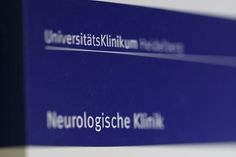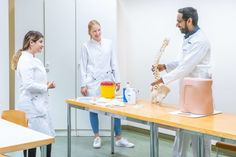Research
Our scientific strategy focuses on the areas of Neurooncology, Vascular Neurology, Neuroimmunology, Acute and Critical Care Neurology, Systems Neuroscience and Neurodegeneration. Our goal is to advance the translation of research findings into clinical application for the benefit of our patients. We have published a series of major papers improving our understanding of neurological diseases. In 2021/2022, our department published more than 360 papers and 15 associated research groups of the department have won numerous peer-reviewed research project grants, adding up to more than € 4,5 m of funding in 2021.
Major program project grants Recently won by our department:
- The Collaborative Reserch Center 1389 called "Understanding and targeting resistance in glioblastoma" was extended for another 4 years (2023).
- The EKFS funded Heidelberg Research College for Neurooncology was extended for another 3 years (2023).
- The Hertie Network of Excellence in Clinical Neuroscience Hertie Network of Excellence in Clinical Neuroscience funding was extended for another 3 years (2023).
- The PerSurge trial: A BMBF-funded controlled clinical study (PI: Prof. Frank Winkler; Prof. Wolfgang Wick) where the activity of perampanel is tested in patients with progressive or recurrent glioblastoma. The rationale of this trial is based on our discovery of growth-stimulatory synapses between neurons and cancer cells which could be inhibited by this drug in preclinical models (Venkataramani et al., Nature 2019; Venkataramani et al., Cell 2022).
Selected publications
Günther R, Wurster CD, Brakemeier S, Osmanovic A, Schreiber-Katz O, Petri S, Uzelac Z, Hiebeler M, Thiele S, Walter MC, Weiler M, Kessler T, Freigang M, Lapp HS, Cordts I, Lingor P, Deschauer M, Hahn A, Martakis K, Steinbach R, Ilse B, Rödiger A, Bellut J, Nentwich J, Zeller D, Muhandes MT, Baum T, Christoph Koch J, Schrank B, Fischer S, Hermann A, Kamm C, Naegel S, Mensch A, Weber M, Neuwirth C, Lehmann HC, Wunderlich G, Stadler C, Tomforde M, George A, Groß M, Pechmann A, Kirschner J, Türk M, Schimmel M, Bernert G, Martin P, Rauscher C, Meyer Zu Hörste G, Baum P, Löscher W, Flotats-Bastardas M, Köhler C, Probst-Schendzielorz K, Goldbach S, Schara-Schmidt U, Müller-Felber W, Lochmüller H, von Velsen O; SMArtCARE Study Group; Kleinschnitz C, Ludolph AC, Hagenacker T. Long-term efficacy and safety of nusinersen in adults with 5q spinal muscular atrophy: a prospective European multinational observational study. Lancet Reg Health Eur. 2024 Feb 6;39:100862
Hai L, Hoffmann DC, Wagener RJ, Azorin DD, Hausmann D, Xie R, Huppertz MC, Hiblot J, Sievers P, Heuer S, Ito J, Cebulla G, Kourtesakis A, Kaulen LD, Ratliff M, Mandelbaum H, Jung E, Jabali A, Horschitz S, Ernst KJ, Reibold D, Warnken U, Venkataramani V, Will R, Suvà ML, Herold-Mende C, Sahm F, Winkler F, Schlesner M, Wick W, Kessler T. A clinically applicable connectivity signature for glioblastoma includes the tumor network driver CHI3L1. Nat Commun. 2024 Feb 6;15(1):968;1-29
Iser F, Hinz F, Hoffmann DC, Grassl N, Güngör C, Meyer J, Dörner L, Hofmann L, Kelbch V, Göbel K, Mahmutoglu MA, Vollmuth P, Patel A, Nguyen D, Kaulen LD, Mildenberger I, Sahm K, Maaß K, Pajtler KW, Shankar GM, Weiler M, Wildemann B, Winkler F, von Deimling A, Platten M, Wick W, Sahm F, Kessler T. Cerebrospinal fluid cfDNA sequencing for classification of central nervous system glioma. Clin Cancer Res. 2024 Jan 31. doi: 10.1158/1078-0432.CCR-23-2907.
Miske R, Scharf M, Borowski K, Rieckhoff N, Teegen B, Denno Y, Probst C, Guthke K, Didrihsone I, Wildemann B, Ruprecht K, Komorowski L, Jarius S. Septin-3 autoimmunity in patients with paraneoplastic cerebellar ataxia. Journal of Neuroinflammation. 2023; 20, 88.
Meinel TR*, Wilson D*, ..., Ringleb P, Goganau I, ... Wu T*, Purrucker J*, Seiffge D* et al. Intravenous Thrombolysis in Patients With Ischemic Stroke and Recent Ingestion of Direct Oral Anticoagulants. JAMA Neurol. 2023 ePub January 03. (*shared first/last authors)
Hausmann D, Hoffmann DC, Venkataramani V, Jung E, Horschitz S, Tetzlaff SK, Jabali A, Hai L, Kessler T, Azorín DD, Weil S, Kourtesakis A, Sievers P, Habel A, Breckwoldt MO, Karreman M, Ratliff M, Messmer JM, Yang Y, Reyhan E, Wendler S, Loeb C, Mayer C, Figarella K, Osswald M, Solecki G, Sahm F, Garaschuk O, Kuner T, Koch P, Schlesner M, Wick W, Winkler F. Autonomous rhythmic activity in glioma networks drives brain tumor growth. Nature. 2022 Jan;613(7942):179-186
Pati S, Baid U, Edwards B, Sheller M, Wang SH, Reina GA, Foley P, Gruzdev A, Karkada D, Davatzikos C, Sako C, Ghodasara S, Bilello M, Mohan S, Vollmuth P, Brugnara G, Preetha CJ, Sahm F, Maier-Hein K, Zenk M, Bendszus M, Wick W, (…), Shah P, Menze B, Barnholtz-Sloan JS, Martin J, Bakas S. Federated learning enables big data for rare cancer boundary detection. Nat Commun. 2022 Dec 5;13(1):7346. doi: 10.1038/s41467-022-33407-5.
Schönrock A, Heinzelmann E, Steffl B, Demirdizen E, Narayanan A, Krunic D, Bähr M, Park JW, Schmidt C, Özduman K, Pamir MN, Wick W, Bestvater F, Weichenhan D, Plass C, Taranda J, Mall M, Turcan Ş. MEOX2 homeobox gene promotes growth of malignant gliomas. Neuro Oncol. 2022 Nov 2;24(11):1911-1924.
Doubrovinskaia S, Mooshage CM, Seliger C, Lorenz HM, Nagel S, Lehnert P, Purrucker J, Wildemann B, Bendszus M, Wick W, Schönenberger S, Kaulen LD. Neurological autoimmune diseases following vaccinations against severe acute respiratory syndrome coronavirus 2 (SARS-CoV-2): A follow-up study. Eur J Neurol. 2022 Oct 18.
Heinrich M, Hofmann L, Baurecht H, Kreuzer PM, Knüttel H, Leitzmann MF, Seliger C. Suicide risk and mortality among patients with cancer. Nat Med. 2022 Apr;28(4):852-859. doi: 10.1038/s41591-022-01745-y. Epub 2022 Mar 28.
Jarius S, Komorowski L, Regula JU, Haas J, Brakopp S, Wildemann B. Rho GTPase-activating protein 10 (ARHGAP10/GRAF2) is a novel autoantibody target in patients with autoimmune encephalitis. J Neurol. 2022 Oct;269:5420-5430
Reiff T, Eckstein HH, Mansmann U, Jansen O, Fraedrich G, Mudra H, Böckler D, Böhm M, Debus ES, Fiehler J, Mathias K, Ringelstein EB, Schmidli J, Stingele R, Zahn R, Zeller T, Niesen WD, Barlinn K, Binder A, Glahn J, Hacke W, Ringleb PA; SPACE-2 Investigators. Carotid endarterectomy or stenting or best medical treatment alone for moderate-to-severe asymptomatic carotid artery stenosis: 5-year results of a multicentre, randomised controlled trial. Lancet Neurol. 2022 Oct;21(10):877-888
Steinmetzger K, Meinhardt B, Praetorius M, Andermann M, Rupp A. A direct comparison of voice pitch processing in acoustic and electric hearing. Neuroimage Clin. 2022 Sep 10;36:103188
Venkataramani V, Yang Y, Schubert MC, Reyhan E, Tetzlaff SK, Wissmann N, Botz M, Soyka SJ, Beretta CA, Pramatarov RL, Fankhauser L, Garofano L, Freudenberg A, Wagner J, Tanev DI, Ratliff M, Xie R, Kessler T, Hoffmann DC, Hai L, Dorflinger Y, Hoppe S, Yabo YA, Golebiewska A, Niclou SP, Sahm F, Lasorella A, Slowik M, Doring L, Iavarone A, Wick W, Kuner T* & Winkler F*. Glioblastoma hijacks neuronal mechanisms for brain invasion. Cell. 2022 185, 2899-2917. * shared first/last authorships
Venkataramani V, Schneider M, Giordano FA, Kuner T, Wick W, Herrlinger U, Winkler F. Disconnecting multicellular networks in brain tumours. Nat Rev Cancer. 2022 Aug;22(8):481-491
Jarius S, Pache F, Körtvelyessy P, Jelčić I, Stettner M, Franciotta D, Keller E, Neumann B, Ringelstein M, Senel M, Regeniter A, Kalantzis R, Willms JF, Berthele A, Busch M, Capobianco M, Eisele A, Reichen I, Dersch R, Rauer S, Sandner K, Ayzenberg I, Gross CC, Hegen H, Khalil M, Kleiter I, Lenhard T, Haas J, Aktas O, Angstwurm K, Kleinschnitz C, Lewerenz J, Tumani H, Paul F, Stangel M, Ruprecht K, Wildemann B; in cooperation with the German Society for Cerebrospinal Fluid Diagnostics and Clinical Neurochemistry. Cerebrospinal fluid findings in COVID-19: a multicenter study of 150 lumbar punctures in 127 patients. J Neuroinflammation. 2022 Jan 20;19 (1):19
Kollmer J, Weiler M, Sam G, Faber J, Hayes JM, Heiland S, Bendszus M, Wick W, Jacobi H. Quantitative magnetic resonance neurographic characterization of peripheral nerve involvement in manifest and pre-ataxic spinocerebellar ataxia type 3. Eur J Neurol. 2022 Jun;29(6):1782-1790
Polymeris AA*, Meinel TR*, Oehler H, Hölscher K, Zietz A, Scheitz JF, Nolte CH, Stretz C, Yaghi S, Stoll S, Wang R, Häusler KG, Hellwig S, Klammer MG, Litmeier S, Leon Guerrero CR, Moeini-Naghani I, Michel P, Strambo D, Salerno A, Bianco G, Cereda C, Uphaus T, Gröschel K, Katan M, Wegener S, Peters N, Engelter ST, Lyrer PA, Bonati LH, Grunder L, Ringleb PA, Fischer U, Kallmünzer B, Purrucker JC*, Seiffge DJ*. Aetiology, secondary prevention strategies and outcomes of ischaemic stroke despite oral anticoagulant therapy in patients with atrial fibrillation. J Neurol Neurosurg Psychiatry. 2022 Apr 8:jnnp-2021-328391. * shared first/last authorships
Steinmetzger K, Megbel E, Shen Z, Andermann M, Rupp A (2022). Cortical activity evoked by voice pitch changes: A combined fNIRS and EEG study. Hear Res. 2022 Jul;420:108483
Platten M, Bunse L, Wick A, Bunse T, Le Cornet L, Harting I, Sahm F, Sanghvi K, Tan CL, Poschke I, Green E, Justesen S, Behrens GA, Breckwoldt MO, Freitag A, Rother LM, Schmitt A, Schnell O, Hense J, Misch M, Krex D, Stevanovic S, Tabatabai G, Steinbach JP, Bendszus M, von Deimling A, Schmitt M, Wick W. A vaccine targeting mutant IDH1 in newly diagnosed glioma. Nature. 2021 Apr;592(7854):463-468







